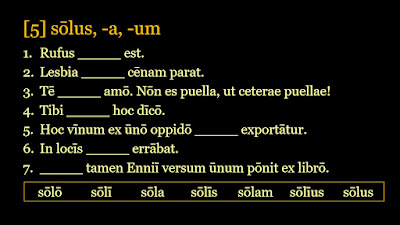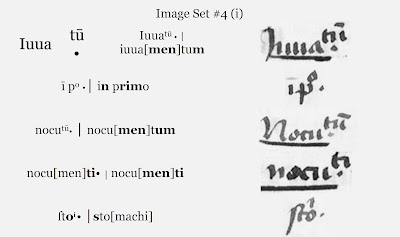“Take a foreign
language, write it in an unfamiliar script, abbreviating every third word, and
you have the compound puzzle that is the medieval Latin manuscript.” (Adriano
Cappelli)
Medieval
manuscripts were heavily abbreviated to save parchment and ink. At first sight,
they seem to be a real uphill climb because it does involve a lot of study,
individual handwriting – both then and now – differs, and there are thousands
of abbreviated forms. Despite that, there is, I feel, a fascination in
deciphering the handwritten work of an author or scribe from the Middle Ages;
it’s the closest you’ll get to that person actually being with you.
Commenting on
Capelli’s work, Heiman and Kay, the translators, state: “in nine cases out of
ten he (the reader) could ascertain the meaning by applying a few simple rules”
i.e. there are common features in the manuscripts.
Points to note:
[i] The rules
governing abbreviations were flexible; scribes did not adhere to them exactly.
However, there are general patterns and context usually allows the reader to
identify which letters are to be supplied for the abbreviation.
[ii] The patterns
discussed here refer only to the text we’re dealing with. While these are
common patterns, it does not follow that what they represent in this text
consistently applies to others, but they are a good start to “cracking the
codes”.
[iii] If you’re
reading a manuscript, try to find as high a resolution as possible
because you very often need to magnify the text to get up close and personal
with the scribe, examine his handwriting and look for patterns in
both the way he forms his letters and the style / types of abbreviations he
uses.
[iv] A single
document can be difficult to decipher since you have nothing to compare it
with. The Tacuinum Sanitatis is a large work, and so, when uncertain,
I was able to cross-reference to establish the pattern of his handwriting style
and the way in which he uses abbreviations elsewhere.
[v] In the case of
this text, I was lucky to find a complete transcription from a reliable
source but no transcription using the original symbols and abbreviations.
Nevertheless, by using the transcription you can “reverse engineer” it by
comparing the full Latin words with the original manuscript to identify exactly
what’s going on.
Terminology
Let’s first
consider some English abbreviations – because the scribes are doing something
similar:
[1] etc. = [i] et ¦ [ii] c(etera); [ii] is
abbreviated by truncation, only the first letter is written, the
abbreviation usually indicated by a full stop [.]
e.g. │ e(xempli)
g(ratia): for example
Fri(day),
Oct(ober)
Nowadays, truncation
is used all the time in text messages:
brb │ be right
back i.e. an assumption is made that the reader is familiar with the
abbreviation or can work it out from context
[2] hr │ hour;
abbreviation by contraction, the middle letters omitted
asst │
ass[i]st[ant]: contraction and truncation
English contracts
all the time by combining two words – sometimes more than two - into one, not
always standard but done to reflect speech:
I’ve │ I have;
he’s │ he is; I’d’ve │ I would have
[3] siglum:
letters or symbols used to represent words
From the Romans: C
│ 100
One symbol we use
every day: @ = at
Mathematical
symbols represent words; one of them (+) appears in this text to represent
‘and’
It doesn’t appear
in this text but we still use one from the Middle Ages: & ‘ampersand’ │ and
[4] superscript:
letters which mark the ending of a word e.g. 1st, 2nd
All I’ll do here
is pick out the common features of this particular text.
Image Set #1
As in English
there can be:
[i] abbreviation
by truncation; only the first part of the word is written out:
ca │ calida
[ii] abbreviation
by contraction; one or more of the middle letters are missing:
gnant │ generant
Image Set #2
A line, horizontal
(e.g. ū) or wavy (resembling the Spanish tilde e.g. ũ) written over a letter
indicates that some letters have been omitted. Usually these letters are m
or n, but this is not always the case.
combining
overline [ ¯ ]
aperiūt │
aperiunt
comedātur
│ comedantur
cōuēiūt
│ conueniunt
cū │ cum
declināt ad
terrā │ declinant ad terram
nutrimentū
bonū │ nutrimentum bonum
nocēt │
nocent
The final image of
Set #2 (opilationes) shows that the line, despite it indicating the absence of
/n/, is written above the final letters
Some writers
describe the mark as a macron, but, in Latin, we use that term now to
refer to the indication of long vowels e.g. puellā, fēmina, vīnum,
ōra, ūrit. However, in a Mediaeval manuscript, a line is not
indicating a vowel length.
Image Set #3
The line does not always indicate the omission of /m/ or /n/
but simply acts as an indicator of abbreviation:
frīs │ frigidis
[a good example where you need to look at his handwriting style, in this case
the formation of /s/ at the end of a word]
remō │remotio
The first title – complectio
– is interesting in that, in other parts of the manuscript (which we are not
looking at here), he abbreviates it in different ways: compl’ / compł / compło
/ complō
In this text he
uses c̄ [complc̄] and also in the
second title: elc̄
[electio]; at first sight, it may look like an /e/ but, examining his
handwriting in other parts of the manuscript, he forms /c/ in the same way;
you can see that formation (looking more like /r/ than /c/) in, for example: ca(lidus)
/ coitu / cū (cum)
Compare the letter
formations in Image Set #3 (ii)
Horizontal lines through letters: q,
p, b, l, h, t with a horizontal or diagonal
line through them, indicate that some letters were omitted which needed to be
supplied by the reader.
The most common letters with a horizontal line were p and q,
and they are both in the manuscript:
[1] reꝑiūtur
│ reperiuntur: it’s difficult to see because it is partially
masked by a red line, but there is a stroke through the letter p: ꝑ
When this happens it can assume different meanings; in this
case ꝑ │ per
(but in other manuscripts it can be, for example, par or por or pre)
[2] poſt¦ꝗ̃ │post¦quam
i.e. the sign represents an entire word
The letter which looks like a 9 indicates /us/ (but can also
indicate -os, -is or just -s); it has a distinctive position always written
above the line and at the end of a word. It can appear in other positions with
a different meaning, but it is the meaning here in the text that concerns us.
cuiꝰ │
cuius

































